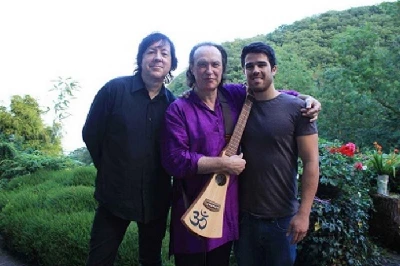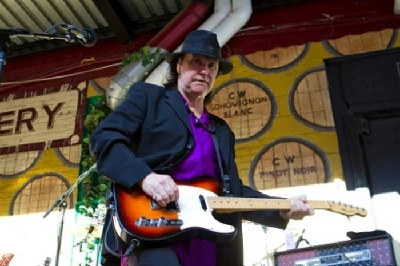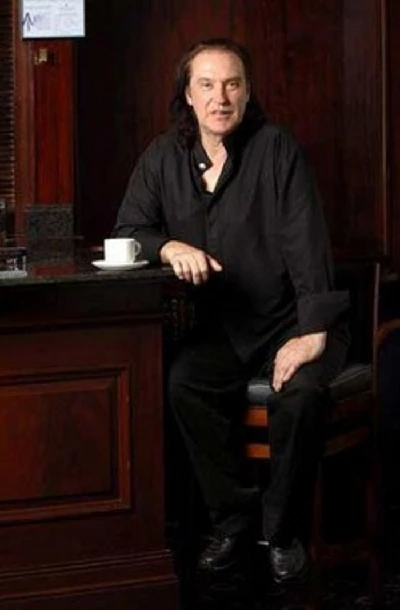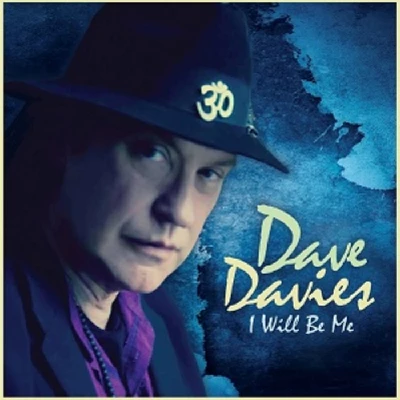published: 25 /
5 /
2013
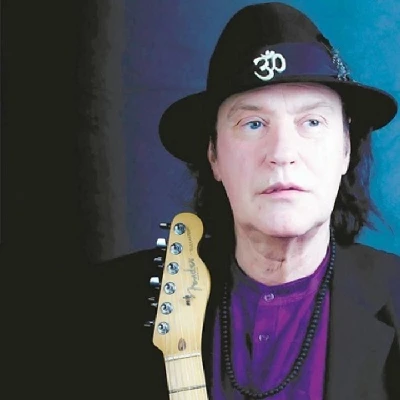
Lisa Torem speaks to former Kinks guitarist Dave Davies about 'I Will Be Me', his new solo album
Article
He is best known for being the Kinks founder and driving guitarist, and creator of the two-chord distorted riff which made ‘You Really Got Me’ a generation’s anthem. He was ranked a respectful 88th in the ‘Rolling Stone’ list of the ‘100 Greatest Guitarists of All Time’, and it is common knowledge that his visceral sound paved the way for hard rock, metal and punk. But Dave Davies, who was the youngest of eight in a musical working class English family, is not only proud of his career, but he is just as excited about life’s intangibles: spirituality and nature.
In his sixth studio album, ‘I Will Be Me’, Davies, through 13 original songs, explores a utopian future, revisits the past and documents some painful personal history. Of course, he doesn’t forget to include some outrageous riffs. He is assisted by international artists from Australia, the US and the UK. Davies is also looking forward to a US tour and spiritual retreats with worldwide friends.
He took time from a busy rehearsal to discuss the new album and the dramatic and heartfelt back stories lurking behind those gyrating chords.
PB: You’ve arranged for some exciting collaborations on ‘I Will Be Me’. When I hear the Bloody Hollies, I hear the early Kinks. There are a lot of cool connections. How did you come up with the ideas for the guest artists?
DD: I worked with an A & R guy from the American label, Cleopatra, John Lappen. Basically I got the songs together first. It took me about a year to write them, and another year to compile all the musicians. John helped me with the personnel. We wanted people that were not just good but that had a feel for it, which is hard. But we got a very respectful mutual interaction, which was great. I like to keep as much humour in the music as possible.
PB: What do you mean by keeping humour in the music?
DD: For example, ‘In the Mainframe’ is really quite a serious and almost paranoid song about losing your mind inside the mainframe, in the computer (Laughs). Maybe it’s happening to us all. We’re getting sucked in – it’s sort of like a film. But there is something amusing about it as well. I like dark humour, and the thought of being stolen or taken away from the world and being put into some mainframe computer actually appeals to my sense of humour.
PB: You created a contrast on ‘Midnight in L.A.’ between London and L.A., which is very graphic. What does it say about your life choices?
DD: I’ve been living in England for about ten years, but I lived in L.A. for a long time. I’ve got a family there and I have children who live there. I’ve always had this, not love-hate, but love-uneasy relationship with L.A. Do you know L.A?
PB: I do. Some people find it difficult to find the centre or a sense of community there.
DD: But what I like about it – I can’t really put my finger on it. It’s very seductive. It’s got not just the great weather there, it’s beautiful, but you think it is better than what it is. It’s got quite a dark side as well.
PB: You like the dark side?
DD: Yeah, in a way. But I think you’ve got to have a lot of optimism to live there unless you were born there. The few people that are actually L.A. people born and bred there are different from the transitory population.
But I lived there a long time, and I had that feeling that I wished I was back home, and I could play darts or go to the pub, and then you find a little clique of English people that live in Santa Monica and hang out there but it’s not the same. So that’s where the idea came from. There are things that I do miss about L.A., and in a way I kind of like twilight around about 4 o’ clock to about 8 o’ clock, I really like that time in L.A. when the sun is out but not prominent and the smells are different.
PB: You mentioned the eucalyptus in the lyric.
DD: I lived just off Kirkwood in Laurel Canyon. I used to love to walk down to Sunset Boulevard and go to the pub. There used to be a pub next to an Indian restaurant right on Sunset, near the Guitar Centre really. I was going to put the Guitar Centre in it but I couldn’t put a handle on the lyric. I called it “guitar showrooms.”
I used to walk down the hill and smell the eucalyptus mixed with smog. I liked all the contrasting smells. I liked the funny little bars in Hollywood and I kind of liked that area, La Brea in Hollywood. It’s really like a no man’s land.
PB: ‘When I First Saw You’, speaking of humour, sounds like the funny side of romance.
DD: A lot of ideas pop out. I was trying to imagine someone inviting me to a suburb, like Oak Park, in Chicago. They invite me in for a drink on a nice sunny day and I don’t really want to be there, but they are very nice people. We’re sipping cheap champagne. I see this lovely young girl – woman and I say, “Wow” (Laughs). I’m making this all up in my head. It goes from there, really.
PB: She sounds like a hippie girl. You mention “the floppy hat.”
DD: Yeah. Jean Shrimpton meets… There is an element of that in there. It could take place in Fulham, in London. Chelsea.
PB: Who sang with you on the duet?
DD: A girl named Geri X -- a young punk and rock singer. I was looking for someone who wasn’t just the run of the mill. I hope she won’t mind me saying this, but someone who was quirky. Something about her voice that was not odd but – a non-stereotypical type singer. She had a good tone that complemented my silliness.
PB: ‘The Healing Boy’ has got Jonathan Lea on sitar. That theme is more spiritual.
DD: It’s about a real experience. About a year and a half ago, my friend Russell had a new baby. When I saw him, when he was first born, I was overwhelmed. There is something very healing about purity and things that are new in this sometimes very harsh world. It can turn you around, and make you feel a lot more lighthearted and happier and maybe think that things are not that bad. Maybe this little baby is showing a light of hope in peoples’ hearts. It’s a simple song really.
PB: You’ve worked quite a bit with your own son, Russ, on some beautiful electronic projects. Will you continue to work with Russ on similar projects?
DD: We worked on the Aschere Project. I loved working with him. You can see in his eyes all this landscaping he’s doing in his mind. He’s great at composition and laying things out and frameworking, and he’s a producer as well. He knows intuitively where a thing has to fit.
We’re trying to get the Aschere Project together as a right show, working with a small ensemble and a girl singer – a seven-piece band or something. We’re creating some new characters, and we are writing some new material to slot into it as well. I’m excited.
PB: ‘Walker through the Worlds’ has another feel. You explore electronica. “Look for me in mother’s eyes” goes one of the lyrics. There is something really hopeful about this song. Is that how you’re feeling these days?
DD: I’ve always been into spiritual stuff since way back. My spiritual love is paramount. The idea of ‘Walker’ came about by imagining this guy (Laughs), me, really, putting yourself in third person. I’m watching this guy – probably me – he feels inspired when he looks up in the sky.
Maybe the universe is a loving mother. Imagine the universe as being a womb that’s allowing all this stuff to go on, nurturing. The nearest thing that we can consciously think about spiritual ideas, maybe we may never know what the universe is, but I think it’s pretty close to that love and that nurturing of being a mother’s eyes.
I started writing about me, and then I write about us and universal things. That’s kind of like about everything really – finding a mother force that’s nurturing and protecting and watching. So the voices are about a male walker. He’s trying to teach the seeker, the person looking up at the sky, about the power of motherhood or divine nurturing.
I also believe in angels and things like that. ‘Walker through the Woods’ is actually about a male angel. When we get lost, he kind of moves into your consciousness or mind.
PB: You wrote a song, ‘Flowers in the Rain’, that reminds me of those images.
DD: I wrote that in L.A. I was missing UK and cricket and the pubs. There’s a place called Dartmoor in the west of England. It’s in Devon, and it is beautiful moorland. It is bleak, and you don’t see many humans. There are lots of animals, and it is a great place to sit and ponder and wonder.
So I was sitting in my apartment in L.A., thinking of Dartmoor and how beautiful the leaves look in the morning with the dewdrops. There is something very poignant and beautiful about it – like a rose with water droplets like tears. There’s something very profound about things like that, like a rose crying.
PB: ‘Energy Fields’ has some of those infamous Dave Davies riffs.
DD: A lot of my musical ideas are like excuses really. It’s like an excuse to celebrate or remind people or inspire people. I like trying to amuse people and I like pathos, and sadness has an intrinsic beauty in it as well. It doesn’t have to be a dark and miserable emotion. It can be quite a beautiful place of sadness. I like to think we become better people by embracing those times or aspects of ourselves.
PB: In ‘The Little Green Amp,’ it sounds like there is a great deal of personal history.
DD: Well, it’s all history, really, in a sense. When I was fourteen or fifteen, I fell in love and my childhood sweetheart and I were going to get married. My parents loathed the idea of it and thought we were too young. In those days, it really was quite a big thing, having a baby out of wedlock. It is normal nowadays, but at that time my parents conspired to keep us apart, which was very, very cruel of them. But that’s just the way it was, and it left me with a lot of heartache and a lot of rage. We were just getting into music, and I imagined us being together. It was a big heartache for me.
The thing about the guitar amp and the razor blade – I was going to use it on me riff and then I saw this amplifier and it sounded like crap so I cut the speaker up, not thinking for a minute that it was going to work after, but it came out with this rasping, raucous noise, which we used on ‘You Really Got Me’ so I thought I’d play around with these ideas.
The riff on ‘Little Green Amp’ is actually ‘You Really Got Me’ back to front.
PB: Back to front?
DD: Yes, in reverse. If you play ‘Little Green Amp’ backwards, it’s ‘You Really Got Me’ (Laughs). I thought I’d play around with it…
PB: That’s so cool. So you still love playing riffs like that?
DD: Oh, yeah. It makes you smile, you know. The first time I played it, I kept smiling.
PB: I was reading over a few of your influences and one name caught my eye. The growling guitar of Duane Eddy inspired you.
DD: He was a big, big influence. He didn’t sing, but I was listening to the guitar and that great twang. My first actual live concert that I saw was Duane Eddy. I loved Eddie Cochran. I thought Chuck Barry was amazing. All great rock is about really great riffs.
PB: But what about Doris Day, who was another one of your influences?
DD: Growing up in a working class family in a small house – Ray and I had six older sisters and there was my mother. It was like a matriarchal kind of set up – growing up with all of these beautiful women around and I think that it was inspiring. So my sisters being older, they brought in their own music. Doris Day had a lovely voice.
PB: And your music is very melodic.
DD: Before I tried to learn to play guitar, it was all melody, Perry Como and all of these lovely musicians. It was all about melody, and I think that helped lay the groundwork for writing. If you mix up Fats Domino with Doris Day, that was me.
I fell in love as well with Jo Stafford’s voice, and I found it was a similar kitsch to mine. I guess I have a high tenor sort of voice. She had a very husky tone, which I loved and that would have come from one of my bigger sisters’ era – late 40’s and early 50’s…
PB: What can you tell us about your touring musicians?
DD: We’ve been running through some ideas, Jonathan Lea and I. He’s been playing guitar with me for quite a while now. They’re two members of a band called Jigsaw Scene, which is Jonathan’s band. It’s like a change for me working with new people. They’re really cool. They played on ‘Midnight in L.A.’ and ‘Healing Boy.’
PB: Will this be primarily acoustic or electric?
DD: It will be a rock show. We’ve been talking about what tracks to use, and will be playing ‘You Really Got Me’ and a few surprises. Hopefully there will be ‘Flowers in the Rain’ and some new music also.
PB: Finally Dave, if you could repeat one day of your life, which one would it be?
DD: Tomorrow.
PB: Thank you.
Band Links:-
https://twitter.com/davedavieskinks
http://www.davedavies.com/
https://www.facebook.com/davedaviesoff
Picture Gallery:-
